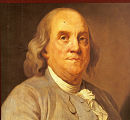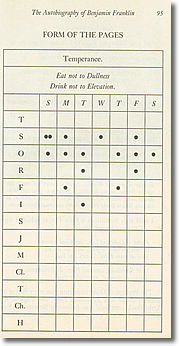Home:
Ben Franklin's 13 Virtues
Ben Franklin's 13 Virtues
 Benjamin
Franklin, one of the Fathers of America, sought
to constantly improve himself by using a plan of 13 virtues, which he
developed
in 1726 at the age 20. Ben
followed this
plan for the
attainment of moral perfection in some form for the rest
of his life. Benjamin
Franklin, one of the Fathers of America, sought
to constantly improve himself by using a plan of 13 virtues, which he
developed
in 1726 at the age 20. Ben
followed this
plan for the
attainment of moral perfection in some form for the rest
of his life.
Ben
Franklin's 13 Virtues
1. Temperance:
Eat not to dullness and drink not to elevation.
2. Silence:
Speak not but what may benefit others or yourself. Avoid trifling
conversation.
3. Order:
Let all your things have their places. Let each part of your business
have its time.
4. Resolution:
Resolve to perform what you ought. Perform without fail what you
resolve.
5. Frugality:
Make no expense but to do good to others or yourself: i.e. Waste
nothing.
6. Industry:
Lose no time. Be always employed in something useful. Cut off all
unnecessary actions.
7. Sincerity:
Use no hurtful deceit. Think innocently and justly; and, if you speak,
speak accordingly.
8. Justice:
Wrong none, by doing injuries or omitting the benefits that are your
duty.
9. Moderation:
Avoid extremes. Forebear resenting injuries so much as you think they
deserve.
10. Cleanliness:
Tolerate no uncleanness in body, clothes or habitation.
11. Chastity:
Rarely use venery but for health or offspring; Never to dullness,
weakness, or the injury of your own or another's peace or reputation.
12. Tranquility:
Be not disturbed at trifles, or at accidents common or unavoidable.
13. Humility:
Imitate Jesus and Socrates.
Ben committed to focusing his attention on one virtue each week, so
after 13 weeks he had completed all 13 virtues. Then he would start the
process over again, and so in one year he would complete his plan a
total of 4 times.
 Ben
tracked his progress in attaining these virtues by carrying around a
small book of 13 charts. Each chart focused on one virtue &
consisted of a column for each day of the week and 13 rows marked with
the first letter of each of the 13 virtues. Ben
tracked his progress in attaining these virtues by carrying around a
small book of 13 charts. Each chart focused on one virtue &
consisted of a column for each day of the week and 13 rows marked with
the first letter of each of the 13 virtues.
He would evaluate himself at the end of each day by placing a dot next
to each virtue he had violated. His goal was to minimize the number of
marks, thus indicating he was moving toward living a more "virtuous"
life free from mistakes.
When Ben first started the program, he put more marks in his book than
he wished, but those marks decreased with time.
And though Franklin admitted in his autobiography that he often fell
short, he believed the process helped make him a better man
& contributed to his success and happiness.
Obviously, Benjamin Franklin's 13 virtues worked well since he is
generally regarded as one of the most successful men in the history of
the United States. In his autobiography Ben also mentioned
he hoped "that some of my descendants may follow the example
and reap the benefit."
References:
http://en.wikipedia.org/wiki/Ben_franklin#Thirteen_Virtues
http://valueinvestingworld.blogspot.com/2007/08/1.html
|







 Benjamin
Franklin, one of the Fathers of America, sought
to constantly improve himself by using a plan of 13 virtues, which he
developed
in 1726 at the age 20. Ben
followed this
plan for the
attainment of moral perfection in some form for the rest
of his life.
Benjamin
Franklin, one of the Fathers of America, sought
to constantly improve himself by using a plan of 13 virtues, which he
developed
in 1726 at the age 20. Ben
followed this
plan for the
attainment of moral perfection in some form for the rest
of his life.  Ben
tracked his progress in attaining these virtues by carrying around a
small book of 13 charts. Each chart focused on one virtue &
consisted of a column for each day of the week and 13 rows marked with
the first letter of each of the 13 virtues.
Ben
tracked his progress in attaining these virtues by carrying around a
small book of 13 charts. Each chart focused on one virtue &
consisted of a column for each day of the week and 13 rows marked with
the first letter of each of the 13 virtues. 



